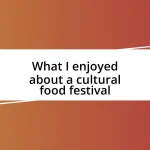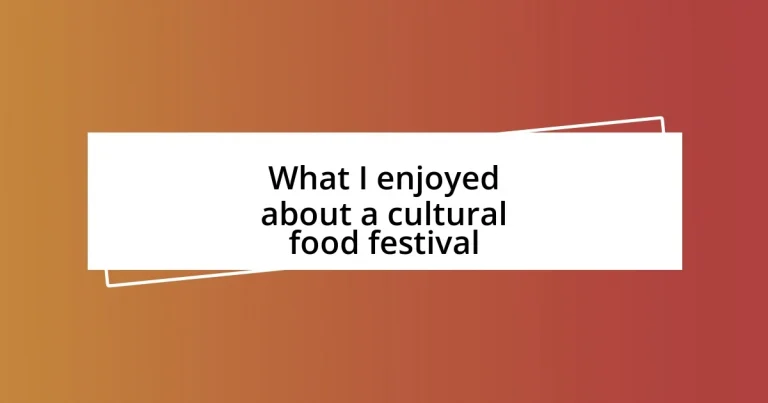Key takeaways:
- Cultural food festivals celebrate diverse culinary traditions, offering a means to connect with different cultures and communities through food.
- Engaging with local chefs and participating in cooking demonstrations enhances the festival experience, fostering a deeper understanding and appreciation of culinary practices.
- Social interactions at food festivals create a sense of community, allowing attendees to bond over shared culinary experiences and personal stories.
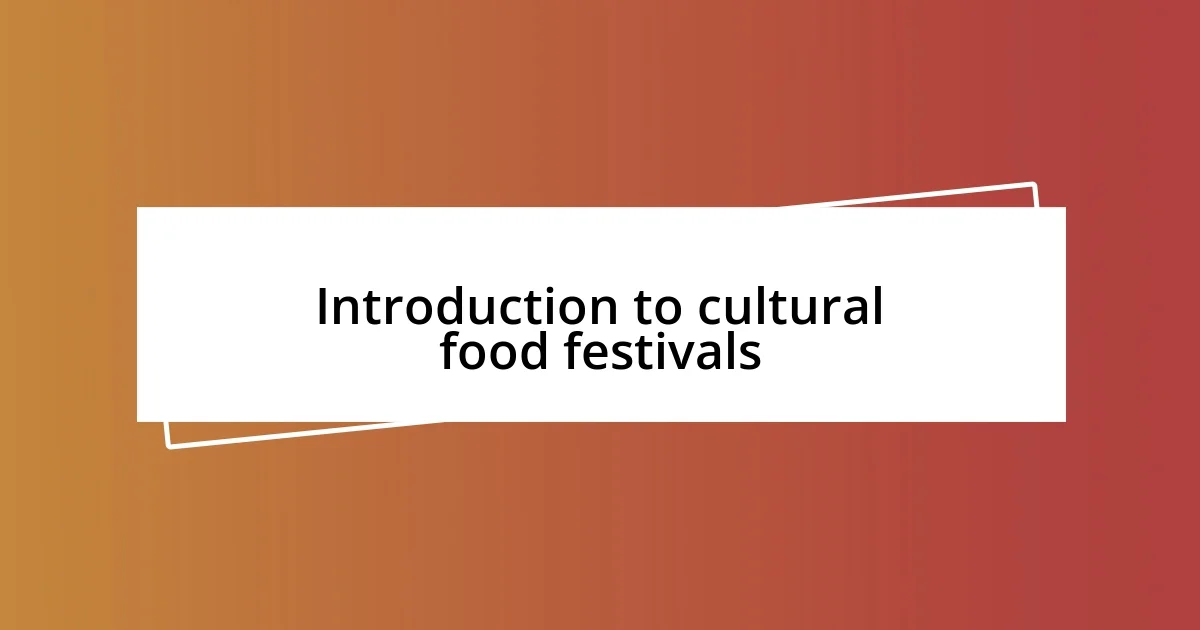
Introduction to cultural food festivals
Cultural food festivals are vibrant celebrations that showcase the culinary traditions of various communities, reflecting their unique histories and identities. I remember the first time I attended one; the aroma of spices wafting through the air instantly transported me to another world. Isn’t it fascinating how food can connect us to our roots and reveal stories that words often cannot articulate?
These festivals offer a fantastic opportunity to not only taste different cuisines but also to understand the culture behind each dish. I still recall savoring a homemade paella at a Spanish festival, the flavors bursting in my mouth as the chef shared stories about the ingredients sourced from local farms. It’s as if every bite was infused with a narrative waiting to be uncovered.
Moreover, these gatherings create a sense of community, drawing people together to celebrate diversity. Have you ever noticed how strangers become friends over a shared love for food? At one festival, I struck up a conversation while waiting in line for some delicious dumplings, and we ended up exploring the event together. What a delightful reminder that food truly has the power to bridge differences and forge connections!
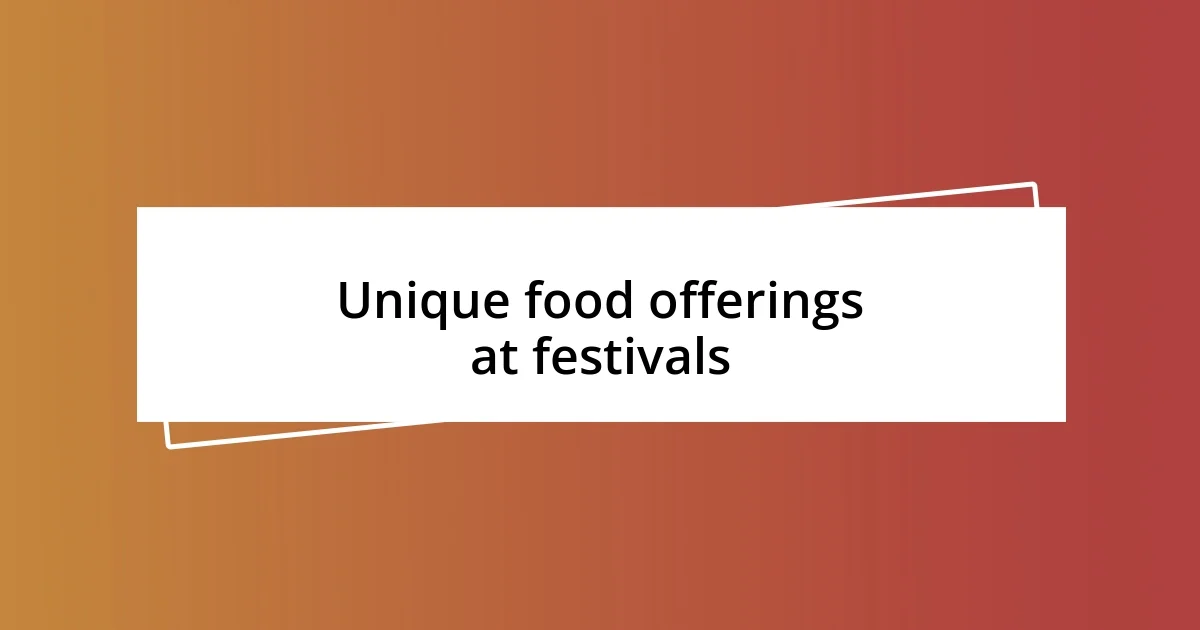
Unique food offerings at festivals
Exploring unique food offerings at festivals can be a delightful adventure. I remember wandering through a bustling festival filled with the inviting scent of freshly grilled octopus at a Mediterranean event. The vendor proudly explained how the traditional marinades were made from family recipes passed down through generations, turning that simple dish into a cherished memory rather than just a meal.
In contrast, at a local Native American festival, I stumbled across frybread topped with a colorful array of local ingredients. Each layer of flavor told a story, and I felt a connection to the community as I savored every bite. This experience reminded me that food isn’t merely sustenance; it’s a profound way to connect with different cultures and their histories.
Festivals often surprise us with fusion dishes that blend culinary traditions. At one event, I tried sushi burritos—a playful combination of sushi and the classic burrito. It was a whimsical take on familiar flavors, and it left me curious about the chef’s inspiration. Isn’t it intriguing how innovation can arise from such dynamic cultural exchanges?
| Unique Dish | Cultural Background |
|---|---|
| Grilled Octopus | Mediterranean |
| Frybread with Local Toppings | Native American |
| Sushi Burrito | Fusion |
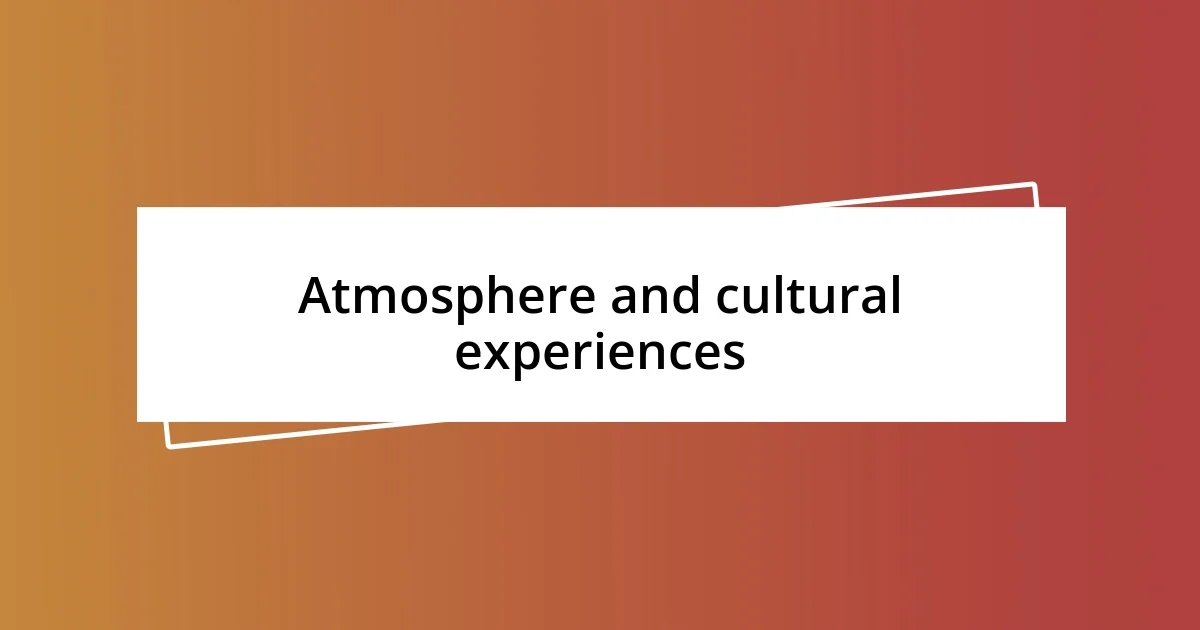
Atmosphere and cultural experiences
The atmosphere at cultural food festivals is nothing short of electric. I remember being swept away by the lively music and colorful decorations that adorned every corner. It was almost as if each culture was shouting, “Come join the celebration!” The warmth of the people around me, sharing laughter and joy, made me feel instantly connected to a collective spirit of togetherness.
- The sound of drums and traditional dances captivating visitors.
- Brightly colored tents and stalls, each showcasing a unique cultural identity.
- The palpable joy in families enjoying meals together, creating a lively tapestry of sounds.
Every moment is infused with experiences that go beyond food; it is a sensory journey. I was particularly moved while watching a traditional dance performance that told stories of resilience and celebration from a culture I hadn’t encountered before. It struck me that these events are not just about tasting food; they’re about embracing the essence of a culture and understanding its people. Being surrounded by the sights, sounds, and vibrant energy truly transformed those fleeting moments into lasting memories etched in my heart.
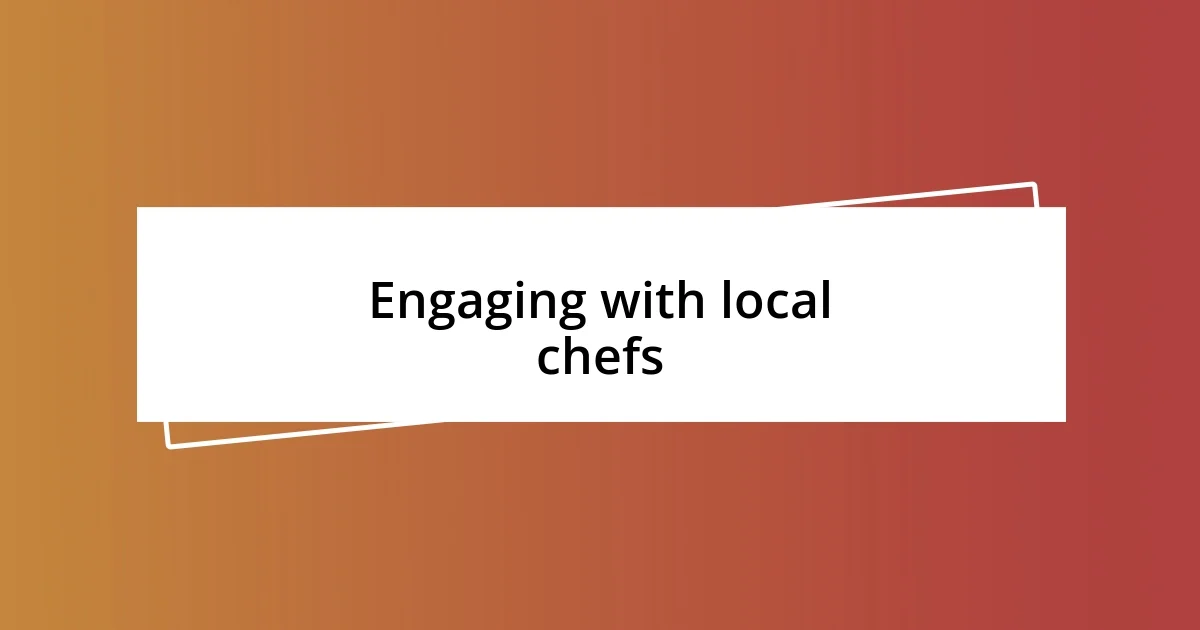
Engaging with local chefs
There’s something incredibly special about engaging with local chefs at a cultural food festival. I vividly recall a moment when I was chatting with a chef who specialized in traditional Thai dishes. As he explained the intricate process of making pad Thai from scratch, I could sense his passion; it was as if each ingredient had a story of its own. Have you ever felt that connection over food? It’s a beautiful reminder of how culinary practices can be threads connecting us to different cultures.
During another festival, I participated in a hands-on cooking demo led by a local chef who shared her family recipes for tamales. The energy in the room was contagious as we all gathered around the cooking station, eager to learn. I remember laughing alongside strangers as we fumbled with masa dough, yet it felt like we were united through shared experiences. It’s astonishing how these interactions create a sense of community, doesn’t it?
I also appreciated the personal touch chefs brought to their presentations. One chef even invited me to taste his unique salsa before it was on the menu. This simple act made me feel valued as part of the culinary journey, turning a casual festival visit into a memorable experience. Engaging with chefs not only deepens our understanding of their craft but also fosters connections that linger long after the event.
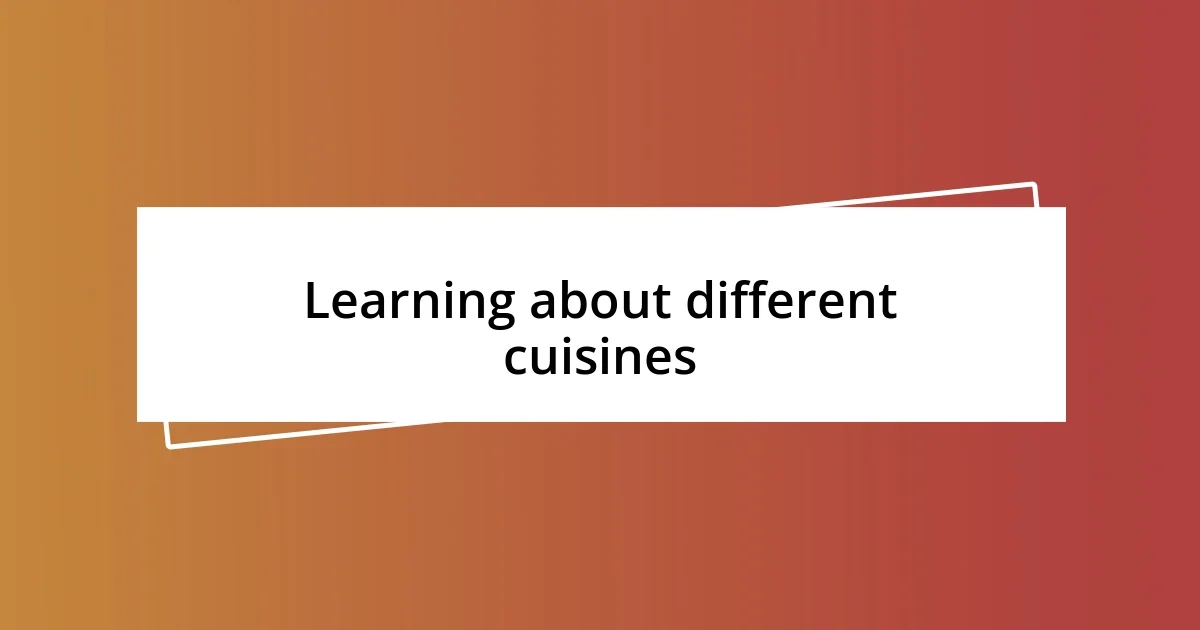
Learning about different cuisines
Cultural food festivals offer a treasure trove of culinary knowledge that extends far beyond just tasting new dishes. I recall the thrill of attending a presentation on Indian spices, where the speaker shared not just how to use them but also the stories behind their origins. It made me reflect on how each spice carries history, tradition, and even a bit of the land from which it comes. Isn’t it fascinating how food can be a gateway to understanding a culture’s geography and history?
One of my standout experiences was learning to make Japanese mochi during a festival workshop. The delicate process of pounding rice to achieve that perfect chewy texture felt almost ritualistic. I remember the satisfied sighs from fellow participants, our hands dusted with starch, as we enjoyed the fruits of our labor. It struck me how such a simple dish embodies the patience and precision inherent in Japanese cuisine. Doesn’t it make you appreciate the artistry involved in cooking?
I also had a delightful conversation with a vendor specializing in Moroccan cuisine, who shared her personal family recipe for tagine. Her eyes sparkled with pride as she recounted the significance of each ingredient, revealing how the dish represented not just flavor, but memories of family gatherings. It made me realize how food connects us to those we love and those who came before us. How can you not feel more attuned to different cultures when food serves as a loving bridge?
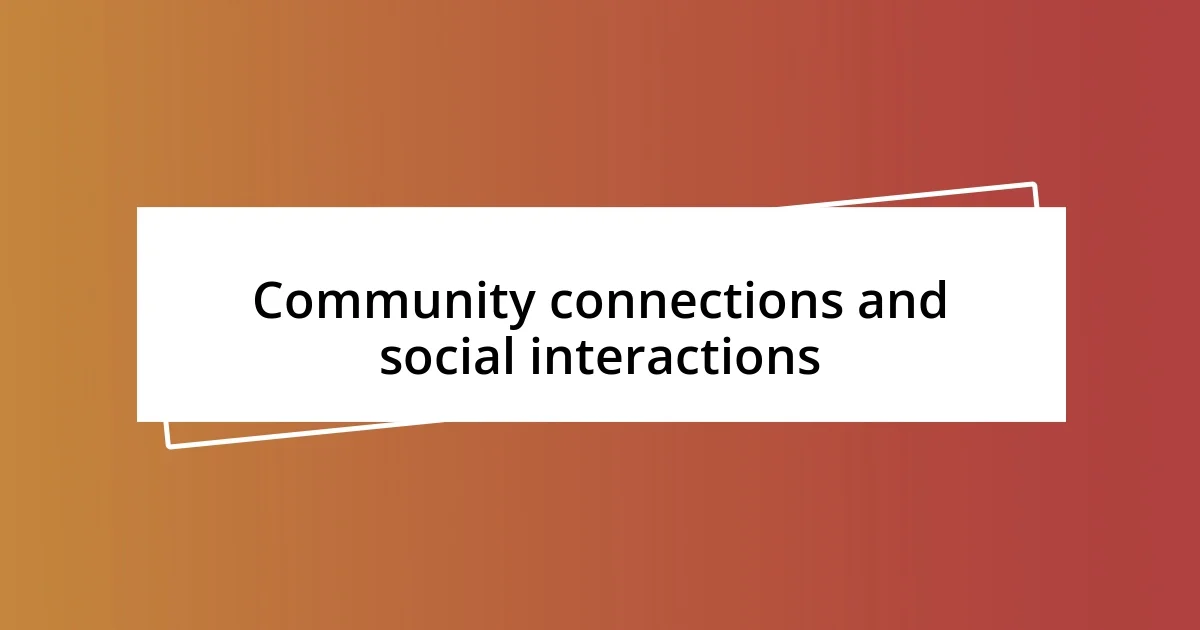
Community connections and social interactions
During a cultural food festival, the blending of different communities was palpable. I remember striking up a conversation with a couple at a Mediterranean booth, where we discovered our mutual love for food and travel. Sharing stories about our adventures over plates of falafel and hummus felt like a warm embrace, a reminder of how food can draw people together, transcending barriers of language and background.
As I wandered through the festival, the air buzzed with laughter and conversation, reflecting the vibrant tapestry of connections being woven. At one point, I found myself sharing a table with a family from South America. We swapped recipes and childhood memories forged in kitchens filled with spices and laughter. That moment underscored for me how food acts as a universal language, creating shared experiences that enrich our lives and deepen our sense of belonging.
In another heartwarming instance, I engaged in a spirited debate with a group of strangers over the merits of different chili recipes. What started as friendly banter quickly escalated into laughter and camaraderie. I still think about how moments like these — the spontaneous connections formed over shared passion — transform a mere gathering into a vibrant celebration of community. Isn’t it remarkable how such interactions can ignite friendships and spark future gatherings?
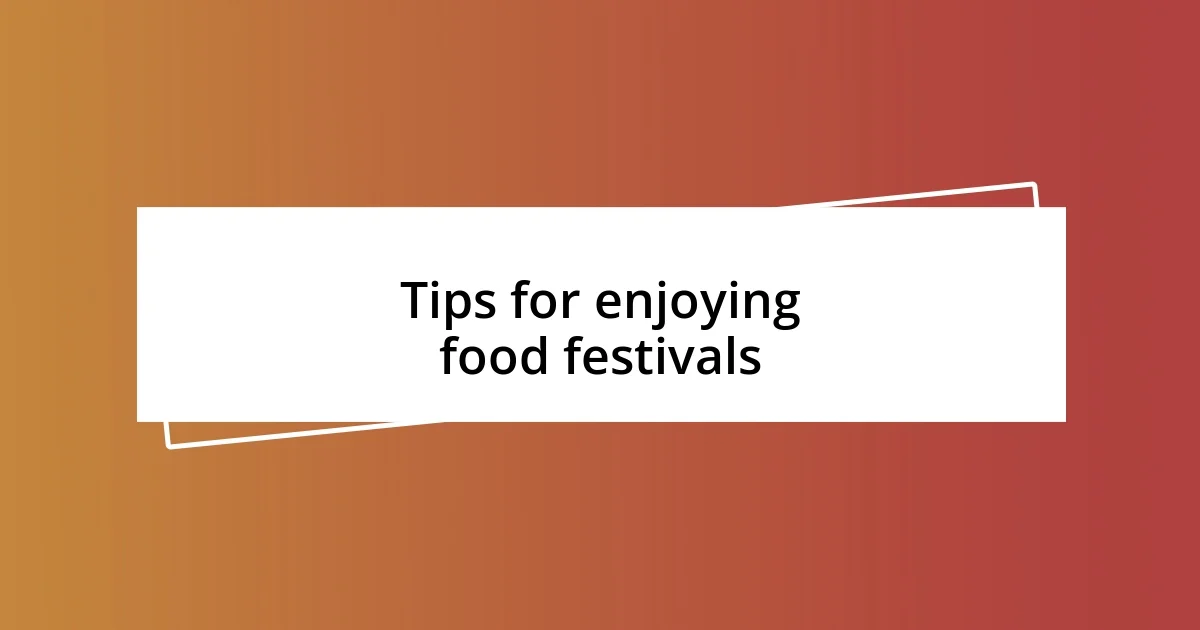
Tips for enjoying food festivals
Navigating a food festival can sometimes feel overwhelming, but I’ve found that a little planning goes a long way. One of my favorite tips is to arrive early. I remember the excitement of being among the first to sample dishes before the lines grew long. It gave me the chance to chat with the vendors, hear their stories, and taste unique items that might be overlooked later in the day. Have you ever found a hidden gem just by being there at the right time?
Don’t hesitate to pace yourself and share your tastings with friends or family. A cultural food festival is built for exploration, and by splitting portions, you can enjoy a wider array of dishes without feeling stuffed. I recall one festival where a friend and I tried everything from savory street tacos to decadent desserts, each bite a piece of a delicious puzzle. What’s better than swapping tastes and exchanging opinions about what’s working and what isn’t?
Lastly, immerse yourself in the experience—seek out demonstrations, participate in workshops, and don’t shy away from asking questions. I distinctly remember a chef at one booth enthusiastically explaining the balance of flavors in their specialty sauce while I eagerly took notes. That level of engagement not only enriched my understanding but also fostered a connection with the culinary world. Isn’t it incredible how being actively involved can deepen your appreciation for each bite?







